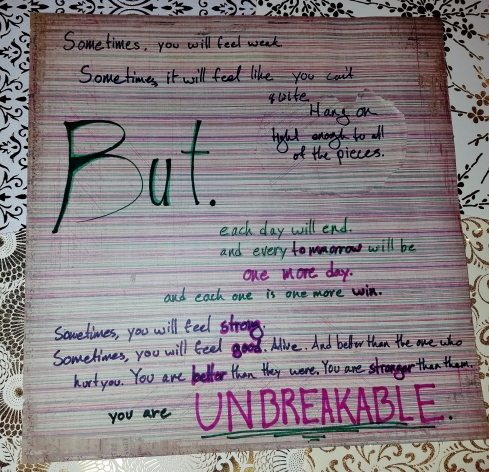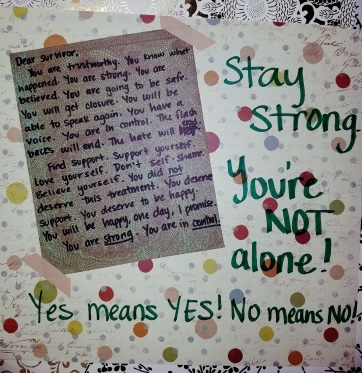Dear Survivor
This guest post was written by a UMBC community member who has asked to remain anonymous to allow for privacy while sharing this important experience.
***Content Note: This post contains detailed descriptions of physical threats and sexual violence, and mentions of suicidal ideation. Please practice self-care while reading.***
Dear Survivor,
I would like to tell you my story of survival. I think that maybe, just maybe, it could provide you with something that will be helpful. I hope that it will. As a survivor myself, I know that lots of people have reacted to me in ways that minimized my experience, or, in contrast, made my experience into the thing that defined me. Both felt like shit. Both made me feel trapped.
I don’t want to do that to you. Instead, I want to show you a path to a future in which your survival matters, but the specific things you have survived are just a distant footnote in your memory.

Dear Survivor letters created at UMBC’s Take Back the Night offer messages of solidarity.
I want to tell you some details about my story. It happened 25 years ago.
I want to share these details because they provide context, and because I want you to be able to judge for yourself whether my experience has anything to offer that will help you cope with the experience that is uniquely yours. Also, I want you to see that my experience was not trivial. It was not small. And yet, looking back across my life, it seems small now.
And so, here it is. My story. It has several parts, as most do.
Thirty-one years ago, when I was in high school, I dated a boy that was kind and pretty and smart. I would later come out as queer, and I would come to understand that I was just going through the motions with him, trying to experience what it might mean to be “normal.” But in the meantime, he provided me with good early dating experiences, for the most part. One day, though, one of his best friends and I were going to meet up with him at a party that we couldn’t get to earlier. I was driving; his friend was navigating. He led me to a dead-end road and asked me to stop the car. I did. He grabbed me by the neck, and forced me to give him a blow job. I choked. I gagged. He laughed and pushed harder. Then, he had me drive him to the party. I did.
I didn’t tell my boyfriend what happened. In my mind, I rationalized that it wasn’t that big of a deal. I didn’t want to come between my boyfriend and his best friend – I thought that would be a mean thing to do. I didn’t understand then that it wasn’t me that had caused the problem.
Then, 28 years ago, when I was in college, I found an incredible feminist community of women who were strong, and beautiful, and loving. But the world was a homophobic and violent place, and many women in that group had been assaulted, and had experienced hate crimes. One community member had been murdered for being a lesbian just before I started school there. Another had been raped by a family member to “cure” her. I learned feminism from these women. I learned that my body was mine to control, that I had power, that there was strength in community. We also frequently told each other that self-defense, and learning to fight was a key to surviving in this world.
** Many people will tell you this: that learning how to fight will protect you. That if you learn to fight, they won’t be able to make you their victim. The underside to that message is that if you were able to fight better in the first place, this wouldn’t have happened to you. **
** That isn’t true. **
** If the person who attacked you wasn’t violent, wasn’t entitled, didn’t believe that their needs/desires/power was more important than yours, this wouldn’t have happened to you. ** If we didn’t live in a rape culture where women’s voices, needs, and autonomy are routinely dismissed, this wouldn’t have happened to you. ** This is not your fault, no matter what angle you take it from. **
** What will end rape and sexual assault is not a change in your behavior. **
After leaving college, and while working in my first professional job, I decided to study martial arts. I was determined that no one would ever touch me again without my permission, and I wanted to be able to defend my friends and those I loved. I signed up, sure that this was the answer.
 I studied martial arts for two years. I was not very good at fighting, but I excelled at some parts of the art, and I loved my teammates, my strength, my confidence, and the joy I felt in achieving greater mastery of each technique. I felt so proud that, after two years, my instructor pulled me aside, and said that he thought I was close to a breakthrough in fighting technique. He suggested that I take private lessons for a while, so he could help me address the weakest link in my skills. I enthusiastically signed on! I had dreams of running self-defense classes in the future, of opening my own martial arts school to empower women and make my own contribution to ending rape culture.
I studied martial arts for two years. I was not very good at fighting, but I excelled at some parts of the art, and I loved my teammates, my strength, my confidence, and the joy I felt in achieving greater mastery of each technique. I felt so proud that, after two years, my instructor pulled me aside, and said that he thought I was close to a breakthrough in fighting technique. He suggested that I take private lessons for a while, so he could help me address the weakest link in my skills. I enthusiastically signed on! I had dreams of running self-defense classes in the future, of opening my own martial arts school to empower women and make my own contribution to ending rape culture.
My instructor said he had been watching, and had observed that specific types of moves made me freeze up. He suggested that we start with those things, and then move on to tournament fighting techniques.
To begin, I froze and felt completely terrified when there was any threat to my neck. So, he started by just touching my neck, and teaching me escape moves. Over a period of months, his “attacks” to my neck got stronger and stronger, to build my confidence that I could escape, no matter the angle, the power or size of the person, and my sense of panic. He practiced pinning me to the ground, and taught me ways to escape and disable my attacker for long enough to get away and get help. For six months, he taught me that even with someone as infinitely muscular as my martial arts instructor, who fought for a living and exercised 18 hours a day, I had power and I could get myself safe. I was so proud of myself, and grateful to my teacher.
Then, he raped me.
It was 25 years ago, and the day seemed pretty normal. We had our lesson, and then went out to lunch. Going out to lunch was a little weird – we hadn’t done that before. But it wasn’t very weird. Then, he was going to drive me home, but also had a meeting after that, and he just needed a few things. So, we stopped by his place. I hadn’t been to his place before, and it felt a little bit weird, but not very weird. We were in his apartment, and he pinned me to the ground. It was weird for him to do that outside of our training environment, but not very weird. He had talked a lot about me needing to practice in lots of contexts so that I could have an automatic response of self-protection, no matter where I was. I thought it was a test.
He grabbed me by the neck. Hard. I couldn’t breathe. He had never grabbed my neck that hard before. I tried all of the moves he had taught me. None of them worked. Then he laughed at me. He said, “You’ll be able to escape from anyone but me. You can’t ever learn enough martial arts to stop me. This is part of your training now. I will fuck you, and you will learn how to do it right. I will do it whenever I want, and you will learn.”
He also told me that he knew where I lived. And that if I told anyone about the new parts of our training that he would kill me in my sleep.
I begged him to stop, and tried different moves, thinking that maybe, just maybe, this was still a part of my training and was just a test. Could I defend myself when I was afraid? But it wasn’t a test. It was just what he was doing.
I survived that. He took me home. And I went to martial arts class the next day because I didn’t want him to think I was upset and going to tell someone. When he said he would kill me in my sleep, I knew that it would take very little effort on his part.
But, I also went to therapy. And, working with a compassionate, gentle therapist, I found a way to stop going to class without being terrified that this assertion was life threatening.
 I was, in most ways, nonfunctional for a long time. I had all the symptoms of PTSD. I was suicidal. I was a wreck. I had triggers, where I would be functioning fine, and then the smallest smell, or facial expression, or sound, would have me back in that moment. I went to individual therapy two days a week, and group therapy once a week, for two years. I talked to my friends. I made new friends. And yet, this experience still defined the majority my existence.
I was, in most ways, nonfunctional for a long time. I had all the symptoms of PTSD. I was suicidal. I was a wreck. I had triggers, where I would be functioning fine, and then the smallest smell, or facial expression, or sound, would have me back in that moment. I went to individual therapy two days a week, and group therapy once a week, for two years. I talked to my friends. I made new friends. And yet, this experience still defined the majority my existence.
Looking back objectively, now, it was awful. It was genuinely life threatening. It was a horrific abuse of trust and safety. It was not a trivial experience that just required a little extra TLC to heal. (To be clear: No survivor’s experience of sexual violence is trivial—regardless of the details—and there’s no set timeline for a survivor’s healing process.)
And yet, now, 25 years later, most of the time I forget that it happened. I went to Take Back the Night last year for the first time in a long time, because I was specifically asked to go to support my community. And I had a realization as I listened to the stories of survivors: I’ve been jogging, by myself, on a path that goes past my rapist’s house for the past several years without even realizing it. I hadn’t thought about him in more than 10 years, at least not consciously. It made me think about how far I had come.
When I think back on my life, about what made me who I am, and what the pivotal moments are, that experience does not rate in the top 10 most important experiences.
Seriously.
I have had losses and successes, joys and pains, and life experiences that shaped me so much more than that moment.
If you had told me that back then, I would have thought you were a heartless asshole. My rapist obviously ruined my life, and to suggest otherwise was to trivialize the violence of my experience.
But he really was not that important in the grand scheme of things. He is no longer powerful.
It took a lot of work and support and therapy and friendship and love to get me to this place. I hope you can hear that. The impact didn’t vanish over night. But once I had that help, once I did all that therapy, once I understood where the blame lived and where it did not, the rest of life happened. My life has had all kinds of twists and turns that were unexpected—that was just one of them.
That was my story. Your story is different. But you survived. And if you can hold on, let others help you, and, when you’re ready, start to live your life again, you may find that this experience didn’t ruin your life, after all.
With love and support and solidarity.
- For more information and resources related to sexual assault and gender-based violence, visit our website or contact the Women’s Center at 410.455.2714.
- UMBC’s Take Back the Night survivor speak out and march against sexual violence will be held on Thursday, April 13th at 6:30pm on Main Street in The Commons.
- The Clothesline Project is available for any survivors who would like to give voice to their experience by decorating a shirt that will be displayed during Sexual Assault Awareness Month.
Posted: April 11, 2017, 12:43 PM